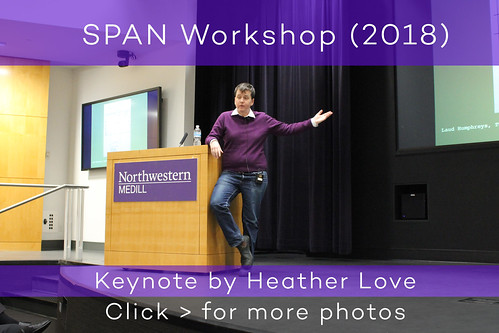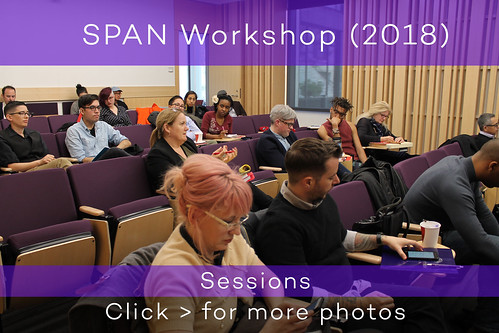2018 SPAN WORKSHOP
Sexual Truths and Post-Truths:
Knowing and Documenting Sexual Worlds
April 19-20, 2018
What are the genealogies and possible futures of practices of documenting sexual worlds and experiences? This workshop explores the production of sexual truths as they emerge from the intertwining of knowledge and affect, documentation and imagination. We take up different conceptions of truth in relation to the sexual—as self-knowledge; as the product of scholarly methods and disciplinary practices; perhaps as a suspect claim in a “post-truth” moment—to consider the origins and legacies of distinctive approaches to perceiving the sexual.
| Program | Keynote Poster | Workshop Poster |
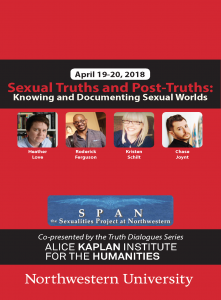 |
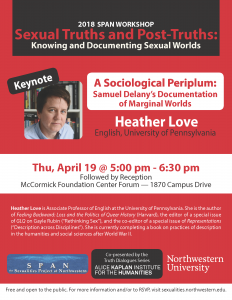 |
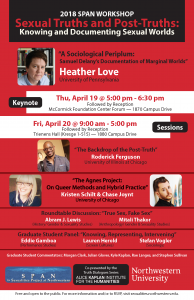 |
Thursday, April 19. 5:00 – 6:30 PM (Followed by reception)
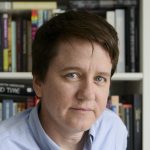 |
Keynote by Heather Love (University of Pennsylvania)
“A Sociological Periplum: Samuel Delany’s Documentation of Marginal Worlds” Heather Love is Associate Professor of English at the University of Pennsylvania. She is the author of Feeling Backward: Loss and the Politics of Queer History (Harvard), the editor of a special issue of GLQ on Gayle Rubin (“Rethinking Sex”), and the co-editor of a special issue of Representations (“Description across Disciplines”). She is currently completing a book on practices of description in the humanities and social sciences after World War II. |
Friday, April 20
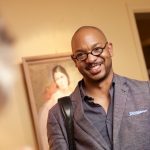 |
“The Backdrop of the Post-Truth” by Roderick Ferguson (University of Illinois, Chicago)
This talk investigates the post-truth ethos in the U.S. as a backlash not simply to the status typically enjoyed by the factual and the empirical but to the affective inroads made by anti-racist, queer and feminist intellectual production. As such, the post-truth moment does not only represent the demotion of empirical knowledge but the unseating of historical and cultural knowledge about racial, gender, and sexual minorities and its potential to disrupt the coherence of subjects privileged by race, gender, and sexuality. As such, the paper theorizes the post-truth moment as encapsulating a resistance to knowledge as well as the affective encounter with knowledge. As an intervention into the study of sexuality, the talk reads the art, writing, and social movements of the 1980s through Audre Lorde’s classic essay “The Uses of the Erotic: The Erotic as Power,” arguing that the erotic identified a social, political, and intellectual ethos of oppositional subjects and movements that were trying to produce not only an empirical confrontation with histories of race, gender, sexuality, class, and empire but an affective engagement as well. |
|
 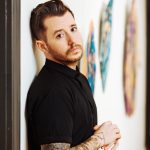 |
“The Agnes Project: On Queer Methods and Hybrid Practice” by Kristen Schilt and Chase Joynt (University of Chicago)
A sociologist and a media-maker walk into an archive… Much like Freud’s classic studies of Dora and the Wolf Man, Harold Garfinkel’s 1967 case study of Agnes has captured the imagination of social psychologists, feminist social scientists, queer theorists, and transgender studies scholars alike. Drawing on newly discovered archival materials, project collaborators Kristen Schilt and Chase Joynt bring Garfinkel’s interviews with Agnes and her contemporaries back into the historical context of the emerging disciplines of sex and gender in the late 1950s. Thinking broadly about contexts of trans representation across disciplines, the pair will also present a portion of their forthcoming experimental documentary, Framing Agnes. Kristen Schilt is an Associate Professor of Sociology at the University of Chicago. She is the author of Just One of the Guys: Transgender Men and the Persistence of Inequality and the co-editor of a forthcoming book titled Other, Please Specify: Queer Methods in Sociology. She currently serves as the Director for the Center for the Study of Gender and Sexuality at the University of Chicago. Chase Joynt is a moving-image artist and writer. His latest two films Genderize and Between You and Me are now streaming online with CBC Digital Docs. His first book, You Only Live Twice (co-authored with Mike Hoolboom), is a 2017 Lambda Literary Award Finalist for Transgender Non-Fiction. He is a SSHRC Postdoctoral Fellow at the University of Chicago. |
|
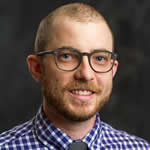  |
Roundtable Discussion: True Sex, Fake Sex
“On Truth and Sex in a Nonmoral Sense!” by Abram J. Lewis (History/ Gender & Sexuality Studies) “Sex and Fakery: Artificial Intelligence and Porn Panics” by Mitalli Thakor (Anthropology/ Gender & Sexuality Studies) |
|
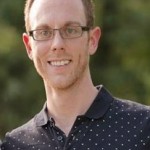 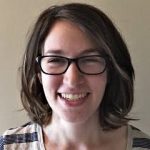 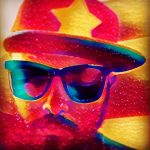 |
Graduate Student Panel: Knowing, Representing, Intervening
“How Does Law Know Sexuality? Expertise and Evidence in Two Legal Complexes” by Stefan Vogler (Sociology) In this talk, I ask how two areas of law that are both charged with determining individuals’ sexualities approach that task. In other words, how do courts attempt to know the truth of one’s sexuality? By juxtaposing asylum determinations of sexual minorities with forensic evaluations of sex offenders, I demonstrate that legal understandings of sexuality are produced in institutionally and historically specific ways that reflect prevailing cultural schemas. I argue that a variety of cultural, political, and institutional factors conspire to create distinct “epistemic logics” in each legal domain that determine what counts as expertise and evidence regarding sexuality. Whereas asylum adjudications depend on narrative evidence of identity development, forensic evaluations rely on bodily and quantifiable measures. These distinct epistemological approaches simultaneously suggest that sexuality is either a subjective phenomenon discernable only indirectly or a bodily phenomenon directly observable through physical measurement. “Queer Televisual Counterpublics: Looking for Gay New York on Cable TV” by Lauren Herold (Screen Cultures) This paper positions local cable television programming in New York City as an archive that offers insight into the structures of feelings circulating in queer communities in the early 1980s. Taking Vito Russo’s show Our Time (1983) as a case study, this paper looks at interviews with LGBTQ people on the street to find new windows into the sexual experiences of queer New Yorkers facing the HIV/AIDS crisis. By considering the queer televisual counterpublics made visible by public access television, this paper explores the way in which understandings of sexuality, health, and community shaped sexual responses to the spread of HIV in the early years of the epidemic. “Sensual Education: Performance, Pleasure, and the Preservation of Queer Opacity” by Eddie Gamboa (Performance Studies) The scholar of queer sex stands at a contradictory intersection made up of a desire to examine queer sexual communities and the concern that such examinations place those very sexual communities at risk by revealing practices of obfuscation. This talk turns to the improvisational sexual education practices developed by queer men, in particular semi-public kink demonstrations designed to introduce, develop, and build a community around sexual practices, in order to question how we as queer scholars can develop a research and reading practice that uses queer opacity as its point of departure. In short, I am interested in using the practices of embodied sexual education as an hermeneutic for discussing queer sexual communities. To do so, I use ethnographic encounters at sexual demonstrations at queer bars on the North Side of Chicago, as well as a photographic series of the queer artist CN, who responded to Craigslist Ads in order to curate aestheticized displays of queer desire. By working in the productive tension between the ethnographic urge to document and the performative drive to imagine, this talk seeks to develop a queer sensual form of research that connects queer sex, the scholar, and their audience. |

